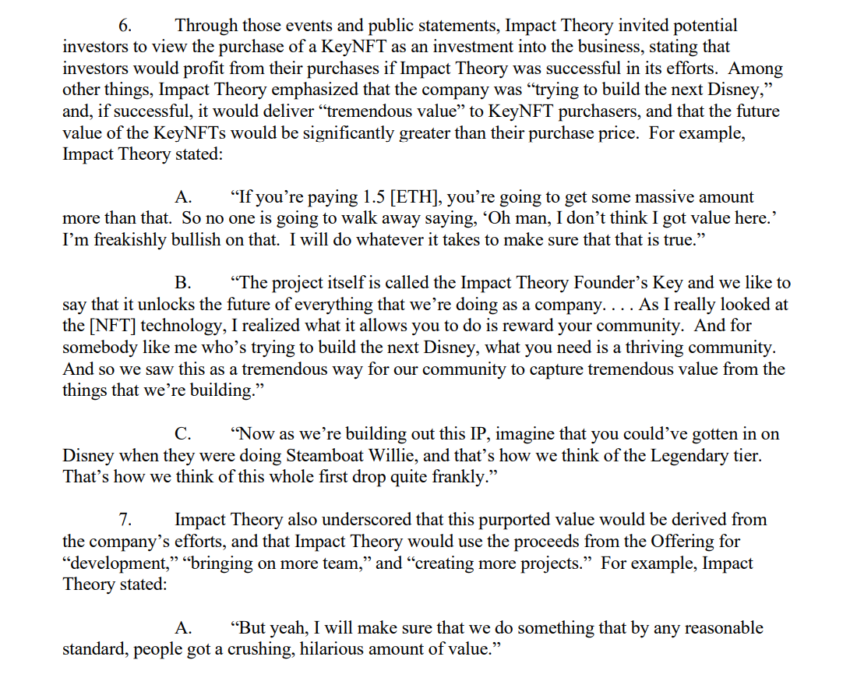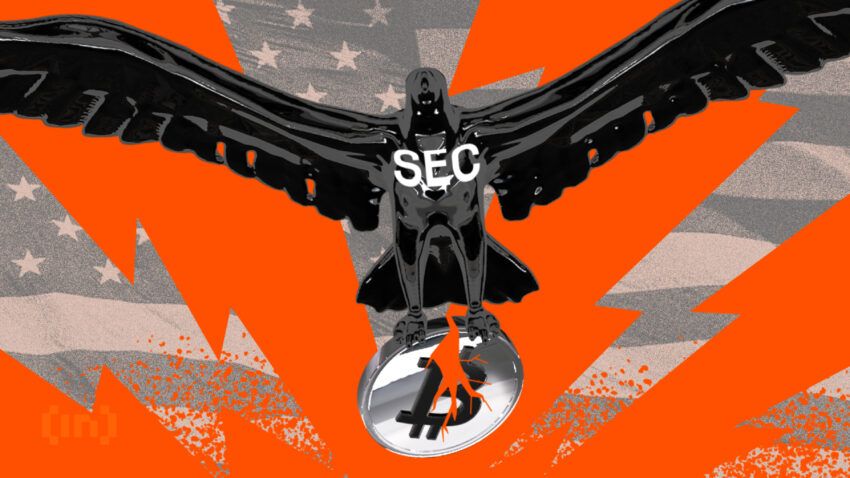The Securities and Exchange Commission charged Los Angeles-based media and entertainment company Impact Theory with conducting an unregistered offering of crypto asset securities. The action is the first enforcement action of its kind against NFTs.
The securities took the form of non-fungible tokens (NFTs) called Founder’s Keys. Impact Theory, an LA media company, raised approximately $30 million from hundreds of investors, across the United States, through the NFT offering from October to December 2021.
Impact Theory Touted the NFTs as Investments Into the Business
Strangely, Impact Theory touted its non-fungible tokens as “investments into the business,” according to the SEC’s statement.
The firm allegedly lured investors with claims that the investors would profit if the company succeeded in its goal to “build the next Disney.”
Both these factors spell trouble, from a legal standpoint. Two characteristics of a security, under the Howey Test, are the “expectation of profit” and the “effort of others.”
Learn more about how the US Securities and Exchange Commission defines a security: What Is the Howey Test and How Does It Impact Crypto?
Impact Theory appears to have made such interpretations markedly easier with its hype the NFTs. In a line quoted in the SEC’s order, Impact Theory stated:
“Now as we’re building out this IP, imagine that you could’ve gotten in on Disney when they were doing Steamboat Willie, and that’s how we think of the Legendary tier. That’s how we think of this whole first drop quite frankly.”
As a result, the SEC determined the NFTs were investment contracts and therefore securities under law. As such, Impact Theory violated federal securities laws by offering and selling the crypto asset securities to the public without registering the offering or getting a registration exemption.

Company Agrees to Settle and Destroy NFTs
To settle the charges, Impact Theory agreed to a cease-and-desist order without admitting or denying the findings. The company must pay over $6.1 million total in disgorgement, interest, and a civil penalty.
The order establishes a fund to return money to injured investors who purchased the NFTs. Impact Theory also agreed to destroy all Founder’s Keys NFTs under its control. It will also publish notice of the order, and forfeit any royalty from future secondary market sales of the NFTs.
Two members of the commission offered a dissent: Commissioner Mark T. Uyeda, and Commissioner Hester M. Peirce. The latter is a well-known defender of the crypto industry and a common dissenting voice on its industry rulings.
In a jointly written statement, the two regulators disagreed with the Commission’s application of the Howey Test in this regard. They acknowledge that they understand why the SEC had concerns about the NFT sale. They continue:
“This legitimate concern, however, is not a sufficient basis to pull the matter into our jurisdiction. The handful of company and purchaser statements cited by the order are not the kinds of promises that form an investment contract. We do not routinely bring enforcement actions against people that sell watches, paintings, or collectibles along with vague promises to build the brand and thus increase the resale value of those tangible items.”
Both raised concerns that the agency’s first enforcement action against the technology would pose vexing issues in the future.
Moreover, a bit of further discussion would be needed to help the SEC “approach the topic sensibly,” they said.
Disclaimer
In adherence to the Trust Project guidelines, BeInCrypto is committed to unbiased, transparent reporting. This news article aims to provide accurate, timely information. However, readers are advised to verify facts independently and consult with a professional before making any decisions based on this content. Please note that our Terms and Conditions, Privacy Policy, and Disclaimers have been updated.


